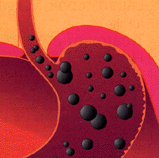 FDA advises that prescription proton pump inhibitor drugs may cause low magnesium blood levels (hypomagnesemia) if taken, in most cases, longer than one year.
FDA advises that prescription proton pump inhibitor drugs may cause low magnesium blood levels (hypomagnesemia) if taken, in most cases, longer than one year.
Proton pump inhibitors reduce the amount of acid in the stomach and treat conditions such as gastroesophageal reflux disease (GERD), peptic ulcers, and inflammation of the esophagus. Continue reading Effect of proton pump inhibitors on magnesium →
 On May 19th, the National Institutes of Health (NIH) premiered its first annual Yoga Week.
On May 19th, the National Institutes of Health (NIH) premiered its first annual Yoga Week.
Others have held yoga weeks in the past. What’s different is the involvement of the NIH. Continue reading First annual Yoga Week →
 The treatment of gastroesophageal reflux disease (GERD) usually includes lifestyle modifications. These include dietary changes such as avoidance of chocolate, mints, citrus, fatty food, carbonated beverages, tobacco, as well as coffee/caffeinated products. Patients are also advised to lose weight, avoid late evening meals and postprandial recumbent position, and to sleep with their right side down.
The treatment of gastroesophageal reflux disease (GERD) usually includes lifestyle modifications. These include dietary changes such as avoidance of chocolate, mints, citrus, fatty food, carbonated beverages, tobacco, as well as coffee/caffeinated products. Patients are also advised to lose weight, avoid late evening meals and postprandial recumbent position, and to sleep with their right side down.
Are any of these recommendations useful?
Continue reading Value of lifestyle modifications in GERD →
 The risk of gastroesophageal reflux disease (GERD) is directly linked to a woman’s body mass index (BMI), according to the results of a study published in The New England Journal of Medicine. Continue reading Got GERD? Watch your weight. →
The risk of gastroesophageal reflux disease (GERD) is directly linked to a woman’s body mass index (BMI), according to the results of a study published in The New England Journal of Medicine. Continue reading Got GERD? Watch your weight. →
Complementary and Alternative Medicine: Fair, Balanced, and to the Point
![]() FDA advises that prescription proton pump inhibitor drugs may cause low magnesium blood levels (hypomagnesemia) if taken, in most cases, longer than one year.
FDA advises that prescription proton pump inhibitor drugs may cause low magnesium blood levels (hypomagnesemia) if taken, in most cases, longer than one year. Â Researchers from Ireland try to sort out the
 Researchers from Ireland try to sort out the  On May 19th, the National Institutes of Health (NIH) premiered its first annual Yoga
On May 19th, the National Institutes of Health (NIH) premiered its first annual Yoga  The treatment of gastroesophageal reflux disease (GERD) usually includes lifestyle modifications. These include dietary changes such as avoidance of chocolate, mints, citrus, fatty food, carbonated beverages, tobacco, as well as coffee/caffeinated products. Patients are also advised to lose weight, avoid late evening meals and postprandial recumbent position, and to sleep with their right side down.
The treatment of gastroesophageal reflux disease (GERD) usually includes lifestyle modifications. These include dietary changes such as avoidance of chocolate, mints, citrus, fatty food, carbonated beverages, tobacco, as well as coffee/caffeinated products. Patients are also advised to lose weight, avoid late evening meals and postprandial recumbent position, and to sleep with their right side down.